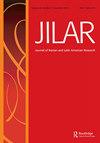关于巴西城市的社会状况、权利和暴力的说明
IF 0.3
0 HUMANITIES, MULTIDISCIPLINARY
Journal of Iberian and Latin American Research
Pub Date : 2021-01-02
DOI:10.1080/13260219.2021.1954796
引用次数: 3
摘要
摘要本文讨论了巴西,特别是里约热内卢和圣保罗的社会条件、权利和城市暴力的转变。贫困、社会不平等和暴力是巴西城市的组成部分,文献中的许多解释表明,这些因素以同质的方式共同存在。然而,最近的广泛变化表明,不同的进程指向不同的方向。经济和政治变革以及公共政策改革扩大了社会福利、收入和获得服务的机会,尤其是穷人。另一方面,城市暴力急剧增加,对下层阶级的打击尤其严重。即使考虑到2015年以来的巴西危机,在回归民主后的三十年里,贫困和重新组合的不平等现象也有所减少,而与此同时,城市暴力也在异质传播。本文从当代巴西公民身份的矛盾建构的角度来讨论这些有时不协调的过程。本文章由计算机程序翻译,如有差异,请以英文原文为准。
Notes on Social Conditions, Rights and Violence in Brazilian Cities
ABSTRACT This article discusses transformations in social conditions, rights and urban violence in Brazil, especially in Rio de Janeiro and São Paulo. Poverty, social inequalities and violence are constitutive of Brazilian cities, and many interpretations in the literature suggest that these elements vary together in a homogeneous way. Recent broad changes, however, indicate divergent processes pointing in different directions. Economic and political transformations, as well as public policy reforms, have expanded social welfare, income and access to services, especially for the poor. On the other hand, urban violence has increased intensely, hitting the lower classes in particular. Even taking into consideration the Brazilian crisis since 2015, the balance of the three decades after the return to democracy is of reduced poverty and recombined but smaller inequalities, while at the same time, urban violence has disseminated heterogeneously. This article discusses these sometimes incongruent processes, viewed from the perspective of the contradictory construction of citizenship in contemporary Brazil.
求助全文
通过发布文献求助,成功后即可免费获取论文全文。
去求助
来源期刊

Journal of Iberian and Latin American Research
HUMANITIES, MULTIDISCIPLINARY-
CiteScore
0.60
自引率
0.00%
发文量
22
 求助内容:
求助内容: 应助结果提醒方式:
应助结果提醒方式:


